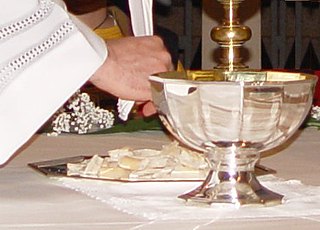
Agnus Dei is the Latin name under which the "Lamb of God" is honoured within Christian liturgies descending from the historic Latin liturgical tradition, including those of Roman Catholicism, Lutheranism and Anglicanism. It is the name given to a specific prayer that occurs in these liturgies, and is the name given to the music pieces that accompany the text of this prayer.
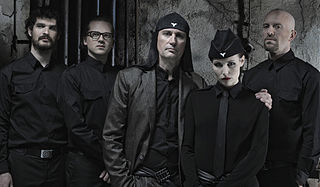
Laibach is a Slovenian and Yugoslav avant-garde music group associated with the industrial, martial, and neo-classical genres. Formed in the mining town of Trbovlje in 1980, Laibach represents the musical wing of the Neue Slowenische Kunst (NSK) collective, a group which Laibach helped found in 1984.

Lamb of God is a title for Jesus that appears in the Gospel of John. It appears at John 1:29, where John the Baptist sees Jesus and exclaims, "Behold the Lamb of God who takes away the sin of the world." It appears again in John 1:36.

Baptism is soundtrack album by Laibach. It is the soundtrack to the Neue Slowenische Kunst production of the same name. All music and lyrics by Laibach, except where noted.

Opus Dei is the third studio album by Slovenian band Laibach, released in 1987. It features "Geburt einer Nation", a German language cover version of Queen's "One Vision", and two reworkings of the Austrian band Opus' sole international hit single "Live Is Life". The Opus song became the German language "Leben heißt Leben" and the English language "Opus Dei". "The Great Seal" is the national anthem of the NSK State, the lyrics taken from Churchill's "We shall fight on the beaches" speech. A new arrangement of the song appears on Laibach's album Volk, with the title "NSK". On Volk, the song is credited to Laibach and Slavko Avsenik, Jr.
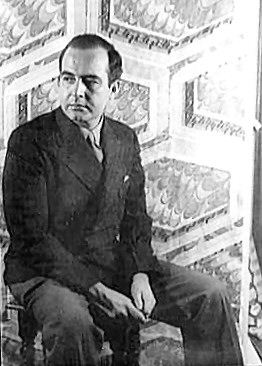
Adagio for Strings is a work by Samuel Barber, arguably his best known, arranged for string orchestra from the second movement of his String Quartet, Op. 11.

Great Mass in C minor, K. 427/417a, is the common name of the musical setting of the mass by Wolfgang Amadeus Mozart, which is considered one of his greatest works. He composed it in Vienna in 1782 and 1783, after his marriage, when he moved to Vienna from Salzburg. The large-scale work, a missa solemnis, is scored for two soprano soloists, a tenor and a bass, double chorus and large orchestra. It remained unfinished, missing large portions of the Credo and the complete Agnus Dei.
The Armed Man is a Mass by Welsh composer Karl Jenkins, subtitled "A Mass for Peace". The piece was commissioned by the Royal Armouries Museum for the Millennium celebrations, to mark the museum's move from London to Leeds, and it was dedicated to victims of the Kosovo crisis. Like Benjamin Britten's War Requiem before it, it is essentially an anti-war piece and is based on the Catholic Mass, which Jenkins combines with other sources, principally the 15th-century folk song "L'homme armé" in the first and last movements. It was written for SATB chorus with soloists and a symphonic orchestra. Guy Wilson, then master of the museum, selected the texts for the mass.
Agnus Dei generally refers to a liturgical prayer in honor of the Lamb of God, as used in Christian theology. It also refers to liturgical music which accompanies this prayer as part of a Mass setting.
Andrew Lloyd Webber's Requiem is a requiem mass, which premiered in 1985. It was written in memory of the composer's father, William Lloyd Webber, who died in 1982.

Missa brevis usually refers to a mass composition that is short because part of the text of the Mass ordinary that is usually set to music in a full mass is left out, or because its execution time is relatively short.

Anthems is a compilation by the Slovenian industrial music group Laibach. It was released in 2004 as a double album. The first CD contains a collection of Laibach's best tracks throughout the years, while the second disc accommodates remixes of Laibach songs by different artists. Besides the CDs, the Anthems box also contains a 44-page booklet with a history of Laibach plus several paintings and photographs by and of the band.

Agnus Dei(Lamb of God) is a choral composition in one movement by Samuel Barber, his own arrangement of his Adagio for Strings (1936). In 1967, he set the Latin words of the liturgical Agnus Dei, a part of the Mass, for mixed chorus with optional organ or piano accompaniment. The music, in B-flat minor, has a duration of about eight minutes.
Macbeth is a play by William Shakespeare.

Volk is the seventh studio album by Slovenian industrial group Laibach, released in 2006. The word "volk" means "people" or "nation" in German and "wolf" in Slovene. The album is a collection of thirteen songs inspired by national or pan-national anthems, plus the anthem of the Neue Slowenische Kunst (NSK) State, a fictional state invented by the band. The album is a collaboration with another Slovenian band, Silence.

Exodus is a Christian compilation album, featuring various artists of Contemporary Christian Music, such as dc Talk, Jars of Clay, Third Day, and Michael W. Smith. The album is noted for recreations of two well-known songs: Third Day recreates Michael W. Smith's "Agnus Dei" with a version still played on the radio today, and Michael W. Smith recreates "I See You", a song written by Rich Mullins, and also plays the song on his second worship album, Worship Again. The album was released on May 16, 1998, and sold in excess of 400,000 copies.
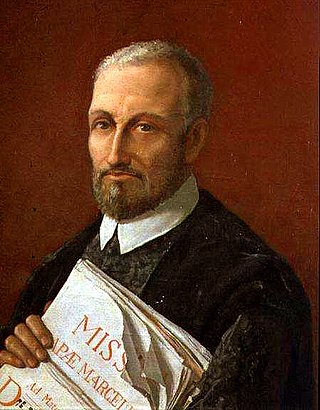
Missa Papae Marcelli, or Pope Marcellus Mass, is a mass sine nomine by Giovanni Pierluigi da Palestrina. It is his best-known mass, and is regarded as an archetypal example of the complex polyphony championed by Palestrina. It was sung at the papal coronation Masses.
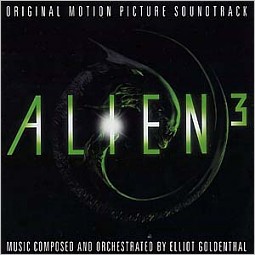
The avant-garde Alien 3: Original Motion Picture Soundtrack was written for the motion picture of the same name. Scored by Elliot Goldenthal, it was his first big mainstream score; he described it as an experiment and spent a whole year creating it.

Mass of the Children is a major work of English composer John Rutter. It is a non-liturgical Missa brevis, with the traditional Latin and Greek Mass text interwoven with several English poems.
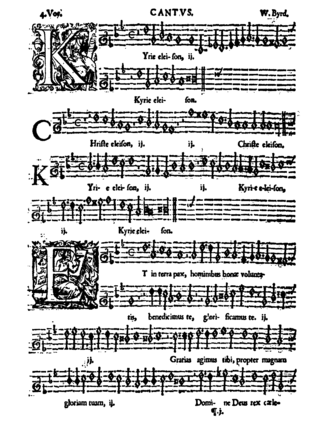
The Mass for Four Voices is a choral Mass setting by the English composer William Byrd (c.1540–1623). It was written around 1592–1593 during the reign of Queen Elizabeth I, and is one of three settings of the Mass Ordinary which he published in London in the early 1590s.















